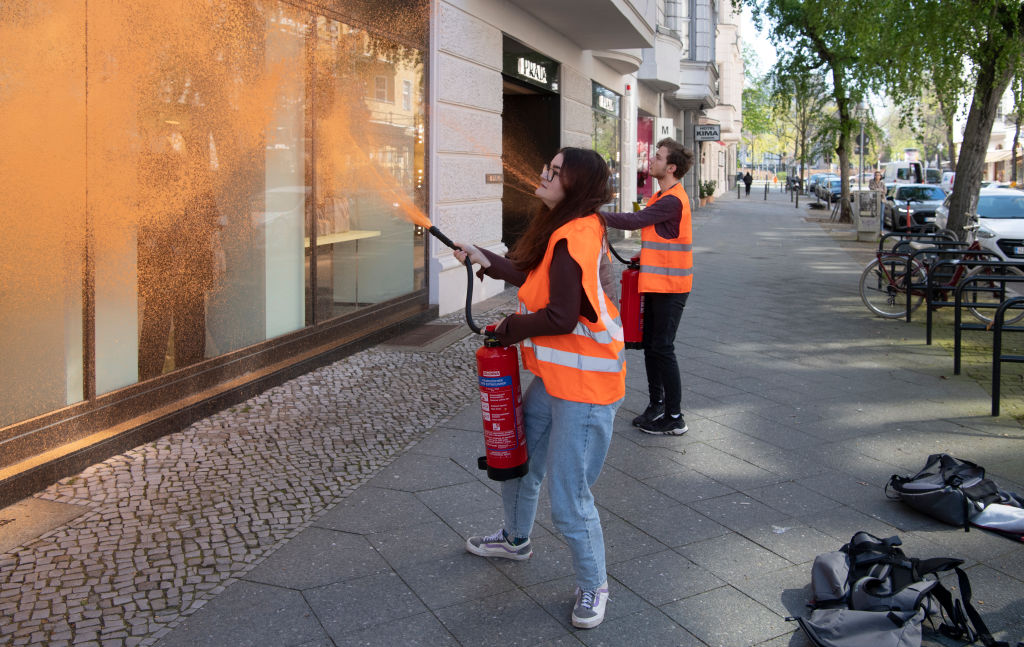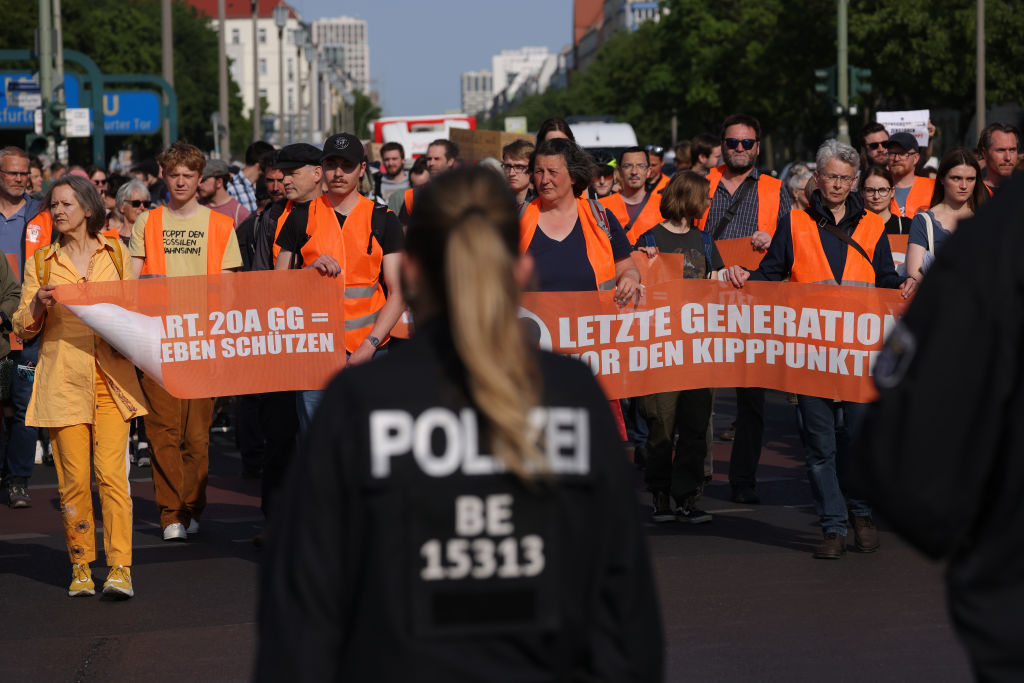On May 24, 170 police in Germany staged a series of raids across the country, bursting into fifteen properties from Bavaria to Berlin. The police carted off evidence, seized bank accounts, and froze assets as part of an ongoing investigation. Such tactics might bring to mind a crackdown on a drug ring or arms smugglers. Instead, the target of these raids was climate advocacy group Letzte Generation (Last Generation).
Letzte Generation is a relatively new climate group, founded in August 2021. Their first major action was a hunger strike by seven activists, demanding a public conversation on climate with the then-candidates for the country’s elections to succeed Angela Merkel as Chancellor. Weeks into the campaign, Olaf Scholz, the current Chancellor, agreed to a sit-down, though the activists were far from satisfied with his climate plan.
These days, the group organizes marches and rallies demanding the country eliminate all human-caused emissions by 2030, two decades earlier than the 2050 goal that underpins most international climate negotiations. They’re also known for gluing themselves to roadways to block traffic, throwing paint on public monuments, and, most memorably, hurtling mashed potatoes on a painting by Claude Monet at a museum in Potsdam (the painting wasn’t damaged). Those are similar to the tactics being employed by other new, radical climate activist groups in the U.K. and across Europe. Members of the Letzte Generation say those actions are necessary to draw attention to the urgency of the climate crisis (though some other climate groups disagree). The methods have divided, and in some cases infuriated, the German public. Motorists trapped behind blockades have assaulted demonstrators. Recently, a truck driver attempted to run them over.
Across Europe, tensions between climate protesters and law enforcement have escalated in recent months. Earlier in July, a U.K. law criminalizing the common tactic of demonstrators locking themselves to vehicles or buildings, and granting police additional powers to quash protests went into effect. In April, the Italian government announced plans to raise fines to between €10,000 and €60,000 for some climate demonstrations. In Germany, the May raids were part of an ongoing police investigation on suspicion of members of Letzte Generation forming a criminal organization. Penalties, if charges and convictions follow, could be up to five years in prison.
Read more: Climate Protesters Are Throwing Soup at Art. A Brooklyn Psychologist Is Behind It
Activists with the group, though, are undaunted. They say that the investigation is part of a state effort to quell peaceful protest to oppose what they frame as a suicidal lack of government climate action. TIME talked with one of the three founders of Letzte Generation, Melanie Guttmann, 27, earlier this week. The following interview has been edited for length and clarity.
TIME: Can you tell me a bit about yourself? How did you find yourself as a leader of Last Generation?
Guttmann: I grew up in a small town near Hamburg, in Germany, and worked in a big logistics company as an IT project leader. I didn’t have much of a clue about the crisis we are in currently. I was on holiday in November 2019 and I read a book… And there was a sentence in the book where they said in 2050, we will have more plastic in the oceans than fish. And I was like, ‘Okay, that sounds like a huge problem.’ So I I started to read more books, and I was shocked because until then, I believed in our government and I had hopes for my future.
It was really hard for me to realize that none of my dreams that I had for my future will come true because of the climate crisis, and that our government is not saving our lives. I felt the responsibility to do something about it. I started going to some Fridays for Future protests and doing some civil resistance with Extinction Rebellion. But after some time, I realized the numbers of members were declining and our government was still not taking any action… So that was how I ended up founding the Last Generation with Henning [Jeschke] and Lea [Bonasera].
Where did things go after the hunger strike?
After the public conversation with Olaf Scholz, I was completely hopeless that he would be able to save us because he didn’t have any plan on how to deal with the climate crisis. So we announced that we would do [a continuous series of] roadblocks starting from January 2022. We started with like 25 people. They were ready to risk being imprisoned—they were ready to risk it all. And they were going into the streets every day. We started with demanding our government take just some small action, just in a symbolic way, like a speed limit [to cut emissions], or a food-saving law, like very small steps where there are almost no arguments against them. Our government was not even ready to do this.

22 April 2023, Berlin: Activists from the environmental group Letzte Generation spray a facade of a luxury store. “The richest Germans emit a thousand times as many greenhouse gases as the average. While the ordinary people have to bear the consequences, a few can buy their way out of the catastrophic consequences of the climate catastrophe, which they have played a major role in causing, for a long time to come,” said a statement from Last Generation about the protest action.
Paul Zinken/picture alliance—Getty Images
So did your demands change from there?
After some time, we just said okay, maybe it’s a systemic problem, that with the way the government is working now they’re just not ready or just not able to save us. So we said, ‘Okay, if you are not doing it, then we need a citizens assembly.’ This is our current demand to the government, to have a citizens assembly where the citizens sit down and make a plan for how to become emission free for 2030.
Read more: Why Climate Protesters Are Throwing Food at Art
A lot of people don’t like you blocking roads. Why upset people like that?
In the protests, we had more and more people blocking roads across Germany, and we also did some other protests, like throwing paint at our governmental buildings and stuff like that. But when we were at the government buildings, we always thought ‘Yeah, we are in the right place.’ There are the people that we want to address. We don’t want to interrupt people in their daily lives. But it only got a fraction of the attention that we got when we blocked a road. I don’t want people to be angry or upset or anything, because I’m doing it all because I want to save people’s lives. But I also realized that we have to interrupt their daily life to get their attention. It’s necessary.
How have participation numbers changed for your group?
We started with 25 people blocking roads. And I think in April, there were more than 700 people on the roads. One day we had more than 2,500 people doing protest marches.
Most people reading major publications like TIME see 2050 as being the year we need to get to Net Zero. That’s the goal the world is aiming for at the annual U.N. COP climate summits, though in many ways we’re not on track. Why is your goal 2030 instead of 2050?
We always have to look at the climate trends from a scientific perspective, and ask ourselves what goal is necessary to prevent the climate catastrophe. We have to listen to what science says. I’m always very frustrated when politicians talk about making compromises. The physical reality doesn’t make compromises. So we have to become emission free by the year that it takes to prevent the worst from happening. So that’s why we are demanding to be emission free by 2030, because it’s absolutely necessary, and we cannot continue emitting until 2050.
What happens if we wait until 2050 instead of eliminating emissions in the next decade?
It’s completely clear that we will have to deal with some of the consequences with storms and floods and so on. But at some point, we will reach these tipping points, and we will not be able to stop the world from heating up more and more, even if we stop emitting. So we really have to stop before this point. And if we don’t, then around the equator there will be huge zones where humans just cannot live anymore because it’s too hot, it’s too dry. And there will be millions, probably billions of people that will have to flee. And I think our global social system can’t deal with it. There will be civil wars, starvation, disasters, and we won’t have enough water anymore. Our civilization as we know it will collapse. And that’s what we have to prevent. If we look at what we are risking if we reach those tipping points, I think it is absolutely necessary to do everything we can.

Supporters of the climate action group Last Generation (Letzte Generation) march in protest following recent police raids against the group on May 26, 2023 in Berlin, Germany.
Sean Gallup—Getty Images
What was your reaction to the police raids in May?
In one case, police came in with a weapon [drawn]. It was an escalation. We are absolutely peaceful and they know it. On the same day, we realized the public [reaction] was escalating, because there were so many people in the protest marches that day supporting us. So it was shocking, but at the same time more people are realizing that the government is treating us this way, and they see a reason to go into the streets for that.
Read more: Why Climate Activism May Look Different in 2023
Are you afraid of the potential consequences that could come from the investigation?
We already had a court decision that mandated five months of prison for one roadblock. So it’s very dependent on which court and which judge you get. But yes, I’m very afraid of going to jail for months or years maybe. I went to jail for six days last year, and I felt so bad. I panicked in there, and I was so afraid. I started to question everything. I just wanted to get out of there and have a peaceful life, spend some time with the people I love, start a family. I was just thinking about those things. And as I imagined this I started to realize that no matter if I’m in prison or not, I will never have those things because the climate crisis destroyed everything I dreamed of for my future.
I feel like I don’t really have a choice. I know that people I love will have to fight for their lives, maybe starve to death or even worse, and that I don’t have a peaceful future. How can I know about that, and not do everything I can to prevent this? I’m ready to risk my freedom and give up everything to prevent it, even if I’m extremely afraid. Nothing else could ever feel so right to do.
More Must-Reads From TIME
#Climate #Activists #Standing #German #Police
